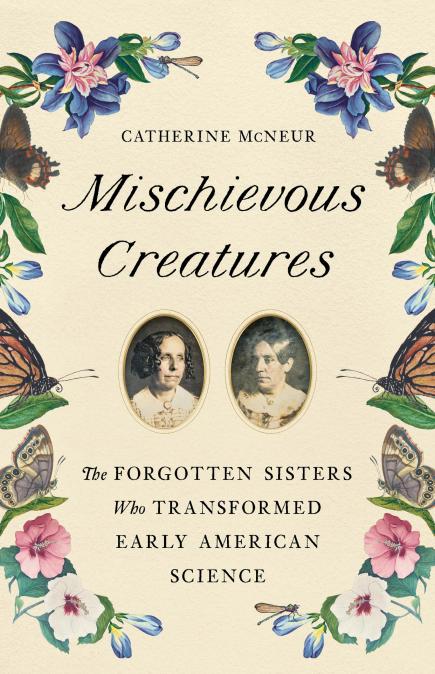Shopping Cart
Mischievous Creatures
The Forgotten Sisters Who Transformed Early American Science
Description
The untold story of two sisters whose discoveries sped the growth of American science in the nineteenth century, combining "meticulous research and sensitive storytelling" (Janice P. Nimura, New York Times-bestselling author of The Doctors Blackwell)
In Mischievous Creatures, historian Catherine McNeur uncovers the lives and work of Margaretta Hare Morris and Elizabeth Carrington Morris, sisters and scientists in early America. Margaretta, an entomologist, was famous among her peers and the public for her research on seventeen-year cicadas and other troublesome insects. Elizabeth, a botanist, was a prolific illustrator and a trusted supplier of specimens to the country’s leading experts. Together, their discoveries helped fuel the growth and professionalization of science in antebellum America. But these very developments confined women in science to underpaid and underappreciated roles for generations to follow, erasing the Morris sisters’ contributions along the way.
Mischievous Creatures is an indelible portrait of two unsung pioneers, one that places women firmly at the center of the birth of American science.
In Mischievous Creatures, historian Catherine McNeur uncovers the lives and work of Margaretta Hare Morris and Elizabeth Carrington Morris, sisters and scientists in early America. Margaretta, an entomologist, was famous among her peers and the public for her research on seventeen-year cicadas and other troublesome insects. Elizabeth, a botanist, was a prolific illustrator and a trusted supplier of specimens to the country’s leading experts. Together, their discoveries helped fuel the growth and professionalization of science in antebellum America. But these very developments confined women in science to underpaid and underappreciated roles for generations to follow, erasing the Morris sisters’ contributions along the way.
Mischievous Creatures is an indelible portrait of two unsung pioneers, one that places women firmly at the center of the birth of American science.
Newsletter Signup
By clicking ‘Sign Up,’ I acknowledge that I have read and agree to Hachette Book Group’s Privacy Policy and Terms of Use
Praise
“An affecting, admirably nuanced portrait of two lives fully dedicated to the pursuit of science.”
—Wall Street Journal
“A fascinating portrait of 19th-century science in the United States from a little-considered perspective.”
—Science
“With deep insight into the gendered power dynamics that shaped the first half of the 19th century, McNeur serves up an incisive study of institutional bias. It’s a vital account.”
—Publishers Weekly (starred review)
“An important contribution to the history of women in science.”
—History: Reviews of New Books
“With detailed research and excellent writing, McNeur has thoughtfully provided a place in history for the sisters that had previously been denied them.”
—Booklist
“A welcome addition to intellectual history that restores two gifted women to the scholarly record.”
—Kirkus
“Catherine McNeur’s meticulous research and sensitive storytelling are exactly what the Morris sisters deserve. She brings their painstaking and painfully underestimated work on ferns and flies, seaweeds, and cicadas to life—and also offers an illuminating case study of the omissions, misattributions, and erasures that have kept female scientists like them hidden for centuries.”
—Janice P. Nimura, New York Times–bestselling author of The Doctors Blackwell
“By excavating the long-forgotten story of the remarkable Morris sisters, McNeur opens a valuable window onto the history of how scientific knowledge is created—and by whom. One will never think of dandelions, cicadas, or science itself the same way after reading this important and beautifully written book.”
—Karl Jacoby, author of Shadows at Dawn
“Mischievous Creatures recaptures the fascinating world of two sister scientists in brilliant detail. The Morris’s lab was their garden, where their unsung work changed the science of their time.”
—Kate Brown, author of Manual for Survival
“In McNeur’s expert narration, a co-biography of sister naturalists in nineteenth-century Philadelphia becomes an excavation of power structures underlying science and history. A triumph of investigative research and artful writing.”
—Jared Farmer, author of Elderflora
“McNeur is a brilliant historian and a gifted writer. Mischievous Creatures is intensely beautiful, deeply humane, and filled with astonishing insights. It will change the way you think about science, the gendered production and reproduction of knowledge, and the workings of the world around you.”
—Ari Kelman, author of A Misplaced Massacre
“What did it mean for a woman to pursue a life in science in the decades before the Civil War? In this elegant and insightful book, McNeur recovers the lives and scientific labors of entomologist Margaretta Hare Morris and botanist Elizabeth Carrington Morris—the wheat flies, cicadas, beetles, ferns, and forget-me-nots that fascinated them; the curiosity that drove them; and the family, friends, and colleagues who sustained them. With stunning work in the archives, McNeur moves the Morris sisters from the margins to the center of the story and changes the way we think about the history of antebellum American science.”
—Ann Fabian, author of The Skull Collectors
